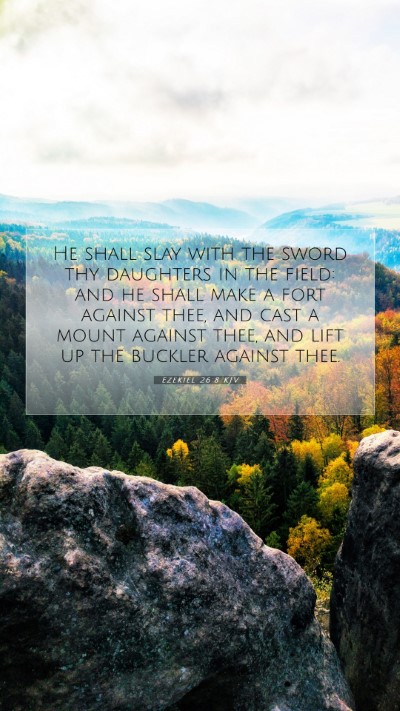Ezekiel 26:8 - Commentary and Meaning
Ezekiel 26:8 states: "He shall slay your daughters in the field; and he shall make your fortresses desolate, and make them a ruin," and depicts the prophecy regarding the destruction of Tyre, a significant commercial city. This verse offers profound insights into the ways God administers justice against nations that oppose His will.
The understanding of this verse requires careful consideration of its historical context and its theological implications. To grasp the significance of Ezekiel 26:8, we draw insights from various public domain commentaries, including those of Matthew Henry, Albert Barnes, and Adam Clarke.
Historical Context
The prophecy in Ezekiel aligns with the historical antagonism between the nation of Israel and Tyre. Tyre was a powerful city on the Mediterranean coast known for its wealth and trade. Ezekiel prophesied against Tyre, foreseeing its downfall as a consequence of its pride and opposition to God’s people.
Commentary Insights
-
Matthew Henry:
Matthew Henry interprets this verse as a clear signal of judgment from God. The destruction of Tyre signifies God’s sovereignty in dispensing justice. Henry notes that Tyre's arrogance and its oppression of God’s people warranted divine retribution, and seeing their daughters slain is a severe warning against societal sins.
-
Albert Barnes:
In Barnes' view, the verse emphasizes the thoroughness of God's judgment. The "daughters in the field" symbolizes both loss and vulnerability, marking a deep impact on the community of Tyre. He highlights the idea that the siege and ensuing destruction were means through which God's righteousness was displayed.
-
Adam Clarke:
Adam Clarke focuses on the imagery used in this verse. He discusses how the destruction of fortresses points to the dismantling of security and pride that Tyre possessed. The verse serves as a stark reminder of the temporary nature of worldly power when opposed to divine authority.
Theological Implications
Theologically, Ezekiel 26:8 presents themes of judgment, justice, and divine sovereignty. The verse reflects God’s holiness and His intolerance of sin within nations, illustrating the balance of mercy and judgment. Furthermore, it invites readers to reflect on their own lives and nations, encouraging a self-examination of pride and righteousness.
Application of the Verse
For Christians, this verse serves as a cautionary tale regarding the consequences of defiance against God. In modern application, it challenges believers to remain humble and recognize their dependence on God's grace, while also emphasizing the importance of opposing injustice in the world.
Cross References
- Isaiah 23:1-14 - Judgment against Tyre.
- Jeremiah 25:22 - Prophecy about nations drinking the cup of God's wrath.
- Ezekiel 28:19 - The fate of the king of Tyre.
- Zechariah 9:3 - References Tyre's wealth and pride.
Conclusion
Ezekiel 26:8 embodies the profound messages woven throughout Scripture regarding the consequences of sin and God's unwavering justice. By studying this verse, individuals can gain a comprehensive understanding of biblical teachings on judgment, sovereignty, and the constant necessity for humility before God in their lives.
Further Study and Reflection
Those interested in Bible study insights, should consider joining Bible study groups or utilizing online Bible study tools to delve deeper into such verses. Examining cross-references and related passages will enrich one's Bible study experience and foster a more profound Bible verse understanding.


